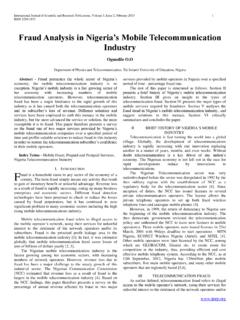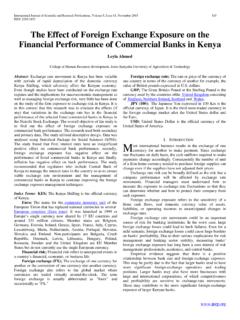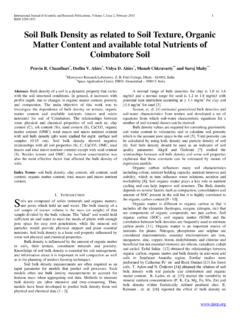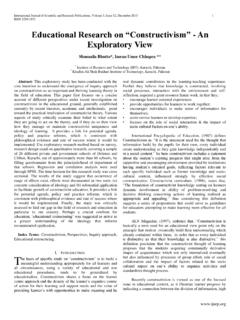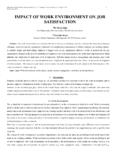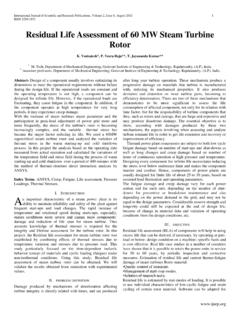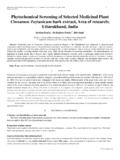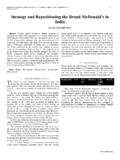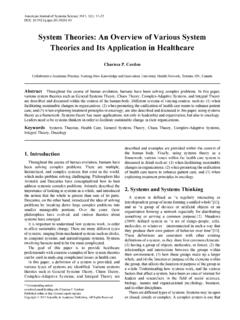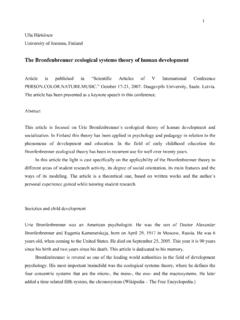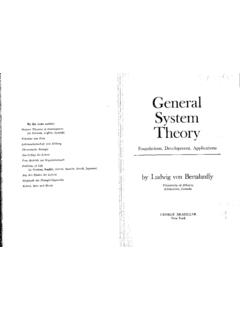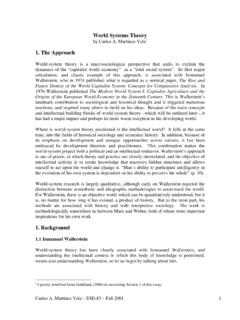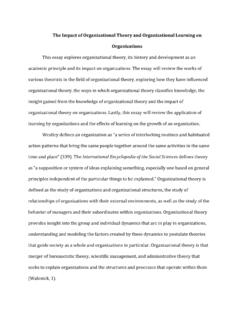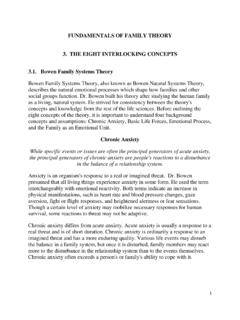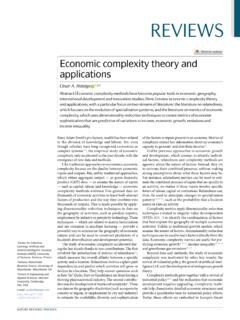Transcription of The Systems Theory of Management in Modern Day ...
1 International Journal of Scientific and Research Publications, Volume 5, Issue 9, September 2015 1 ISSN 2250-3153 The Systems Theory of Management in Modern Day Organizations - A Study of Aldgate Congress Resort Limited Port Harcourt Chikere, Cornell and Nwoka, Jude2 1 Plot 308, Abacha Road, Phase3, Port Harcourt 2 Department of Management , Ignatius Ajuru University of Education, Port Harcourt Abstract- This paper examines the Systems Theory of Management in Modern day organizations with an highlight on an indigenous company based in Port Harcourt.
2 In this work, an introductory perspective was captured to show an understanding of what the Systems Theory is all about, revealing the input-output model. The paper categorizes the Systems Theory into two thought areas: the cybernetic and closed Systems on one side and the biology and open Systems on the other side, and differentiations made. Systems Theory focuses on the relations between the parts, rather than reducing an entity into its parts or elements. The organization is considered as a system having integrated parts that must be coordinated for efficiency and effectiveness.
3 The null hypothesis of no relationship between application of system Theory of Management and organizational success was rejected. The study found that the organization under study adopts Systems approach. The study recommends that Modern organizations should adapt Systems approach to enhance corporate growth and profitability. Index Terms- system , Management , organization, technology and firms. I. INTRODUCTION cientists and philosophers have long wrestled with the problem of how they understand and make sense of our world.
4 There are both descriptive and prescriptive approaches to understanding our world. On the descriptive side, theories of cognition, perception and thinking describe how we humans organize stimuli and make sense out of them. On the prescriptive side, there are two approaches to making sense of the world. The first is reductionism and the other is a Systems approach. Reductionism asserts that the best way to understand new phenomena is to study the functioning or properties of its individual parts.
5 For example, the best way to understand the working of the human body would be to break it into its components, (organs, muscles, tissues, bones, and cells) and to study the properties of each element (Miller and Rice, 1967). Systems Theory focuses on the relations between the parts. Rather than reducing an entity such as the human body into its parts or elements ( organs or cells), Systems Theory focuses on the arrangement of and relations between the parts and how they work together as a whole. The way the parts are organized and how they interact with each other, determines the properties of that system .
6 The behaviour of the system is independent of the properties of the elements. This often referred to as a holistic approach to understanding phenomena. Flood and Jackson (1991) define a system as a complex and highly interlinked network of parts exhibiting synergistic properties-the whole is greater than the sum of its parts. It is a collection of interrelated parts acting together to achieve some goal which exists in the environment. Also, system is defined as a set of objects together with relationships between the objects and between their attributes related to each other and to the environment so as to create or form a whole (Schoderbek et al, 1985).
7 Further, Checkland (1981) defines a system as a model of a whole entity, which may be applied to human activity. With respect to Management , system simply refers to a set of different independent parts working together in interrelated manner to accomplish a whole. It is with this essence that synergism appears. For instance, an organisation is formed by different departments, sections, and units composed of individuals and groups which are independent, but working together to achieve a common goal with the aim of turning organizational vision into reality.
8 This paper is aimed at showcasing the Systems Theory of Management in Modern day organizations in Nigeria. This is to be achieved with the study of a key player in the hospitality industry in the city of Port Harcourt Aldgate Congress Resort Limited. This paper aims at studying the Systems Theory of managing organizations. Emphasis has been made on the application of this Theory in the Management of Modern day organizations. For this purpose, a Modern day organization based in Port Harcourt was chosen as a case study.
9 The present day organization is faced with the challenges of adoption of a specific style of Management in its day to day operational decision making. These could be seen manifesting in a variation of several Management philosophies that has evolved over the years. Theories exist that are drawn from the scientific Management school, the classical organization Theory school, the behavioural school and the relations theories. Others are the Management science school and some recent developments in Management Theory ; the Systems approach and the contingency approach respectively.
10 Over the years transcending down history, organizations have either adopted a particularmanagement model or a combination of models. Whichever model that is adopted, the survivability and maximisation of profit is often a key objective for operations. This paper is out to uncover the level of the application of Systems Theory in the running of Modern day S International Journal of Scientific and Research Publications, Volume 5, Issue 9, September 2015 2 ISSN 2250-3153 organizations.
